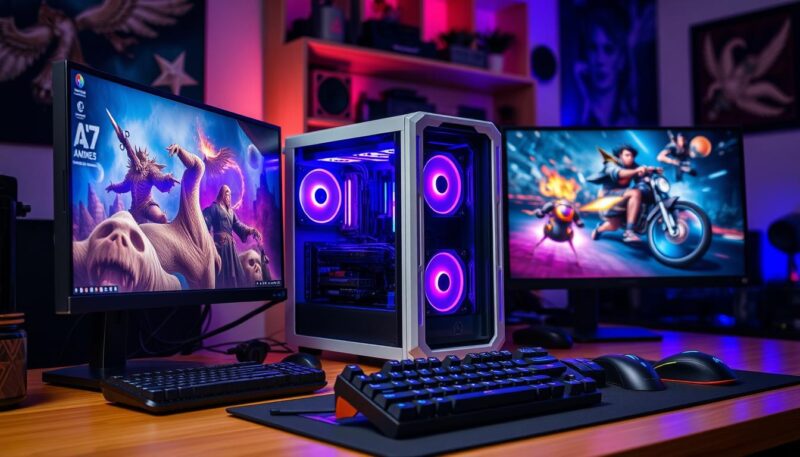Building your own gaming PC can feel overwhelming, especially when threadbare finances cling to your ambitions. However, rest assured that assembling an affordable gaming rig is entirely feasible without sacrificing performance. In this comprehensive gaming PC guide, you’ll discover how to build a gaming PC on a budget while enjoying an immersive gaming experience. The remarkable thing about budget gaming PCs is that with some foundational knowledge and strategic planning, you can piece together an impressive setup that accurately aligns with your gaming aspirations.
Let’s dive into the world of affordable gaming rigs—armed with insights into key components like CPUs, GPUs, and memory. As you navigate through this guide, you’ll learn about the latest in technology trends, such as how to optimize your build within a specific budget. For instance, you could successfully assemble a high-performing setup for just £870, incorporating components like the MSI Mag B760 Tomahawk motherboard, Intel Core i5 13400F CPU, and an Nvidia GeForce RTX 3050. Alternatively, if you’re keen on an even more budget-friendly approach, you might put together a satisfactory build for only £585 by utilizing an Intel I3 13100 processor and a GeForce GTX 1050 TI graphics card.
Whether you’re here for the thrill of gaming or the challenge of building, this article aims to equip you with the knowledge you need to build a gaming PC on a budget without cutting corners on quality. Prepare to embark on your PC builds 2025 journey, turning your gaming dreams into reality, all while keeping your finances in check. Let’s get started!
Understanding the Basics of a Budget Gaming PC
Building a gaming PC on a budget is a rewarding journey that enhances your gaming experience without breaking the bank. Knowing the essential parts for gaming PC is vital as these components directly impact your system’s performance. To maximize your investment, focus on budget-friendly tech that offers excellent value while meeting gaming performance requirements.
Essential PC Components for Your Build
The foundation of any gaming PC is its components. When assembling your system, pay attention to the following:
- Motherboard: Serves as the central hub connecting all PC components. Choose one that fits your needs without overspending.
- CPU (Central Processing Unit): This is crucial for processing speeds. Mid-range CPUs, such as the Intel i5 or AMD Ryzen 5, provide a good balance between budget and performance.
- GPU (Graphics Processing Unit): Essential for rendering graphics. Look for affordable gaming hardware like the Nvidia GTX series, which can greatly enhance your gaming experience.
- RAM: A minimum of 16GB is recommended to ensure smooth multitasking and quick load times during gaming.
- Storage: SSDs offer faster load times than traditional HDDs. Consider a hybrid setup with both for a good balance of speed and capacity.
- Power Supply Unit (PSU): Choose a reliable PSU to ensure stable power delivery to your components.
- Case: Opt for a functional and aesthetically pleasing option that supports good airflow.
Budget-Friendly Tech: What to Focus On
When prioritizing which components to invest in, striking a balance between budget vs. performance is key. Focus on maximizing the effectiveness of your spending by choosing mid-range options instead of premium models. The processor and graphics card should be your main priorities for achieving decent gaming performance. Avoid spending on flashy cases and RGB lighting; practicality should always come first. Quality cooling solutions, such as fans or liquid cooling, are necessary to prevent overheating during intense gaming sessions.
Choosing Between CPU and GPU for Best Performance
Selecting the right balance between CPU for gaming and GPU for gaming significantly influences your system’s overall effectiveness. While powerful GPUs enhance graphical fidelity and frame rates, the CPU handles game logic and overall system performance. Allocate your budget to ensure equitable investment in both components, preventing performance bottlenecks. Aim for specifications that allow for at least 1080p resolution and frame rates of 60-144Hz. For instance, pairing an Intel i5 with an Nvidia GTX 1660 can yield excellent results in modern gaming titles.
| Component | Budget Option | Performance Option | Recommended Use |
|---|---|---|---|
| CPU | Intel i5-12400 | Intel i7-13700K | Ideal for mid-range gaming |
| GPU | Nvidia GTX 1650 | Nvidia RTX 3060 | Good for AAA titles |
| RAM | 16GB DDR4 | 32GB DDR4 | Multitasking and gaming |
| Storage | 500GB SSD | 1TB SSD + 2TB HDD | Fast access and ample storage |
How to Build a Gaming PC on a Budget
Embarking on your journey to create a budget gaming PC assembly requires thoughtful planning and resourcefulness. Start by establishing a clear budget that encompasses not only your components but also the often-overlooked peripherals such as monitors, keyboards, and mice. Every penny counts, so prioritize crucial components like the CPU and GPU while ensuring you remain within your financial limits. Familiarize yourself with key considerations for building a PC, such as compatibility and performance expectations, to maximize your investment.
Planning Your Build: Key Considerations
As you lay the groundwork for your build, utilizing comprehensive online resources becomes essential. Thoroughly research each component and consult user reviews and benchmarks to identify the best options within your budget. A workspace free from static hazards and proper tools like a Phillips screwdriver will aid in a smooth assembly process. Taking your time to learn and compare different parts ensures that you can create a powerful gaming setup without overspending.
Resource Tools: Using PCPartPicker for Cost-Effective Solutions
One of the most invaluable platforms at your disposal is PCPartPicker. This tool streamlines the process of comparing PC prices across various retailers, helping you find the most cost-effective solutions. As you piece together your build, the platform not only checks for compatibility issues but also tracks price fluctuations, ensuring that you purchase components at the best possible rates. For budget-conscious gamers, leveraging PCPartPicker can significantly reduce costs while building a gaming rig that meets your performance needs.

